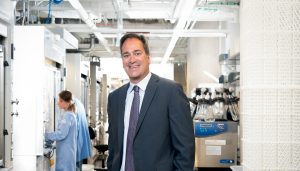Awards and Honors
Chad Mirkin to receive Silicon Valley American Chemical Society (ACS) Harry and Carol Mosher Award
December 11, 2019
Northwestern University’s Chad A. Mirkin will receive the Harry and Carol Mosher Award, for “outstanding” work and contributions to the field of chemistry, from the Silicon Valley American Chemical Society (SVACS).
Mirkin, one of the most cited chemists in the world and one of the most accomplished individuals in nanotechnology in history, is the George B. Rathmann Professor of Chemistry and director of the International Institute for Nanotechnology (IIN) at Northwestern. He will receive the award and an honorarium during the SVAC meeting in Palo Alto, California on Thursday, Jan. 23, 2019.
“Established in 1980 by the Silicon Valley local section of the ACS, the Harry and Carol Mosher award recognizes excellence in chemistry, advancement of the chemical profession and public service to promote chemical enterprise,” said Natalie McClure, PhD, chair of the Mosher Award Committee. “Professor Chad Mirkin has embodied all aspects of this award: his research has provided new tools for the diagnosis of disease and new tools for drug development, and he has helped shape public science policy through his service on the President’s Council of Advisors on Science and Technology (PCAST).”
“Being notified that I won the Harry and Carol Mosher Award was a pleasant surprise, especially since the list of previous winners is a who’s who list of notable chemists,” said Mirkin. “I thank the Silicon Valley section of the American Chemical Society for this extraordinary honor.”

Mirkin is primarily known for his invention of spherical nucleic acids (SNAs) used in materials and colloidal crystal engineering, extracellular and intracellular molecular diagnostics, gene regulation and immune modulation. Currently, SNAs are the basis for more than 1,800 commercial products, including four drugs undergoing human clinical trials. He also is the inventor and chief developer of several pioneering nanoscale fabrication and analytical tools, including Dip-Pen Nanolithography, Polymer Pen Lithography and Beam-Pen Lithography. He is the co-founder of many companies, including Nanosphere, AuraSense, Exicure, TERA-print, and Azul 3D.
Mirkin is one of a rare group of individuals elected to every U.S. National Academy (science, medicine, engineering and inventors) and the recipient of some of the world’s most prestigious prizes. With more than 1,200 issued and pending patents, and thousands of nano-based products on the market, he has played a significant role in translating his scientific discoveries into technologies that are changing the world. One of his inventions, dip-pen nanolithography, was recognized by the National Geographic as one of the top 100 innovations of the last century.
At Northwestern, Mirkin also is a professor of medicine at the Northwestern University Feinberg School of Medicine and a professor of chemical and biological engineering, biomedical engineering and materials science and engineering at the McCormick School of Engineering. Mirkin served for eight years as a member of PCAST under President Barack Obama. He has been recognized for his accomplishments with more than 230 national and international awards and honors, including the Kabiller Prize in Nanoscience and Nanomedicine, the SCI Perkin Medal, the Friendship Award, the Nano Research Award, the Raymond and Beverly Sackler Prize in Convergence Research, the Dan David Prize, the Wilhelm Exner Medal, the RUSNANOPRIZE, the Dickson Prize in Science, the American Institute of Chemists Gold Medal and the $500,000 Lemelson-MIT Prize. He has served on the editorial advisory boards of more than 20 scholarly journals, is the current associate editor of the Journal of the American Chemical Society (JACS) and the founding editor of the journal Small, one of the premier international nanotechnology journals. Mirkin also has co-edited multiple bestselling books.
Mirkin holds a bachelor’s degree from Dickinson College (elected into Phi Beta Kappa in 1986) and a doctorate in chemistry from Pennsylvania State University (1989). He was a National Science Foundation postdoctoral fellow at Massachusetts Institute of Technology (MIT) prior to becoming a professor at Northwestern University in 1991.
The International Institute for Nanotechnology at Northwestern University is an umbrella organization that represents and unites more than $1 billion in nanotechnology research, education and supporting infrastructure.